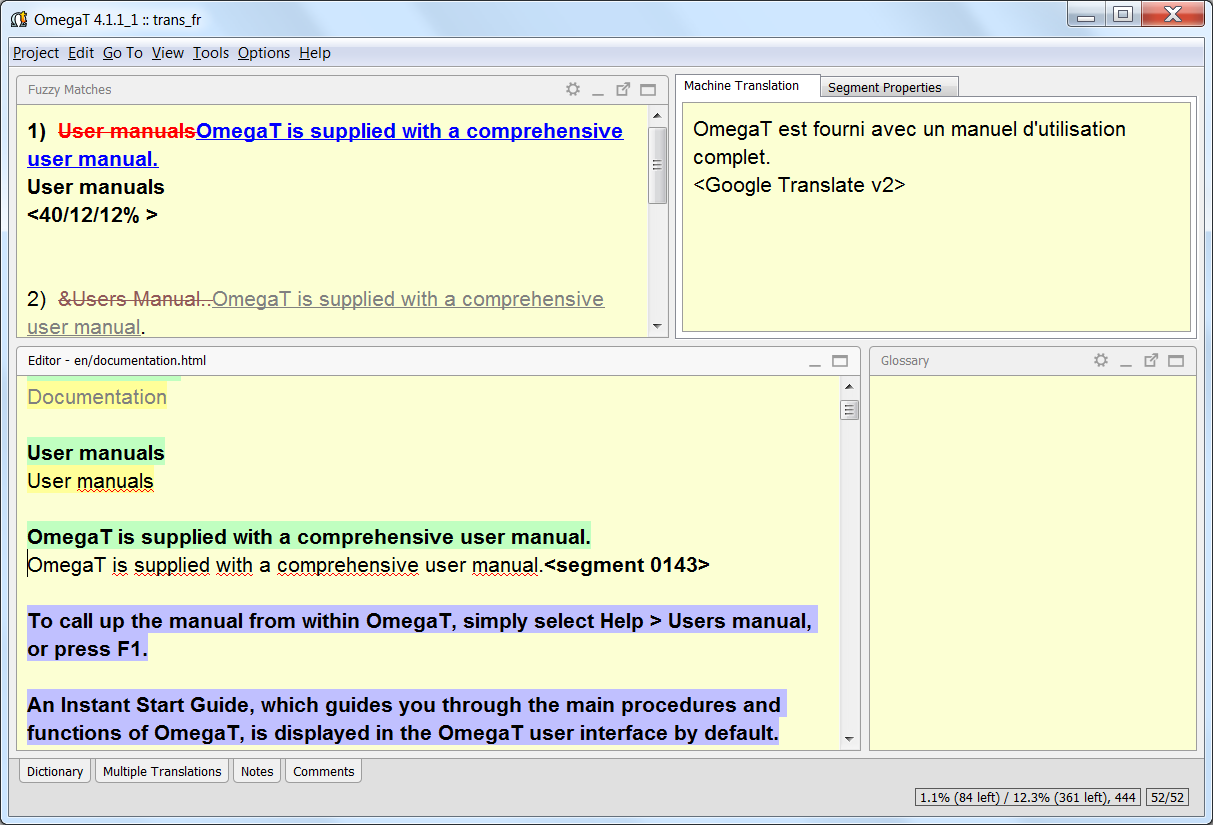OmegaT is a translation memory application that works on Windows, macOS, Linux… It is a tool intended for professional translators. It does not translate for you! (Software that does this is called "machine translation". OmegaT can interface to some machine translation programs or Internet services)
OmegaT is free software. That means that users like you can download and use it with no restrictions. You are also free to copy it and pass it on to other people and even modify OmegaT to suit your own requirements. A more detailed explanation of free software can be found on the Free Software Foundation website.
Professional features
- Fuzzy matching
- Match propagation
- Simultaneous processing of multiple-file projects
- Simultaneous use of multiple translation memories
- User glossaries with recognition of inflected forms
Work with more than 30 file formats
- Microsoft Office Word, Excel, PowerPoint (2007 or later)
- XHTML and HTML
- OpenDocument Format (native file format for LibreOffice, Apache OpenOffice)
- MediaWiki (Wikipedia)
- Plain text
- …and around 30 other file formats
Powerful tools
- Unicode support: can be used with various alphabets and scripts
- Support for right-to-left languages
- Integral spelling checker that uses Hunspell dictionaries (same as in other software such as LibreOffice or Mozilla FireFox)
- Compatible with other translation memory applications via exchange formats such as TMX, TTX, TXML, XLIFF, SDLXLIFF
- Interface to machine translation/neural machine translation software/Web services
Download
OmegaT is available in many different versions in order to suit a range of user requirements.
To find the version most suitable for you, follow the link below to the Download Selector.
Alternatively, if you already know which version you wish to download, click on the button to have an overview of the different OmegaT versions available.
The OmegaT project and you
OmegaT isn't just a product; it's an exciting project, and you can be part of it.
The OmegaT project would benefit from greater support from volunteers in almost all areas. Although many users are aware of this, their reaction is often "But I can't program!". Programming is certainly the most important function, and without programming, there is no program. But programming isn't the only job needing to be done. Below is a list of areas for which further volunteers would be more than welcome!
Documentation authoring
Documentation is very important. Many of you reading this will be translators who have translated a lot of user documentation. Have you considered writing some user documentation yourself? It's a real eye-opener!
Localization
Thanks to the work of translators in the past, OmegaT's user interface and/or Help texts have been translated into several languages. That means there are only a few thousand left! Localizing OmegaT into other languages is also an ongoing task, since new features and functions are being added all the time. Please contact the OmegaT Localization Co-ordinator for details of what is involved in localizing/translating OmegaT.
Testing
One of the most useful things OmegaT users can do is... to use OmegaT. And when they find things that don't work, or deficiencies in the documentation, to tell us about them.
Also, consider testing weekly builds of OmegaT that may contain even more new and fascinating bugs!
Publicity
Have you ever written an article for your professional association's journal? If not, why not write an article on using OmegaT?
Donations
If you have found OmegaT useful and would like to express your gratitude by making a donation on our Paypal account.
Programming (Java)
OmegaT is written in Java. If you're a programmer, and you happen to know Java, please check the OmegaT contribution guide, or its document source text in the source code under /docs_devel for information on how to get started.
Programming (not Java)
If you can program in another language, you can write code to support the core application. Such auxiliary code has already been written in Javascript, Groovy and Tcl/Tk, for instance.
But I can't program at all, I hear you say. Well, have you considered learning? If you are already reasonably familiar with computers in general and choose a straightforward scripting language like Javascript or Tcl/Tk, you could teach yourself enough to be able to write simple but useful scripts within just a couple of weeks. Continuing Professional Development is the current buzzword!


